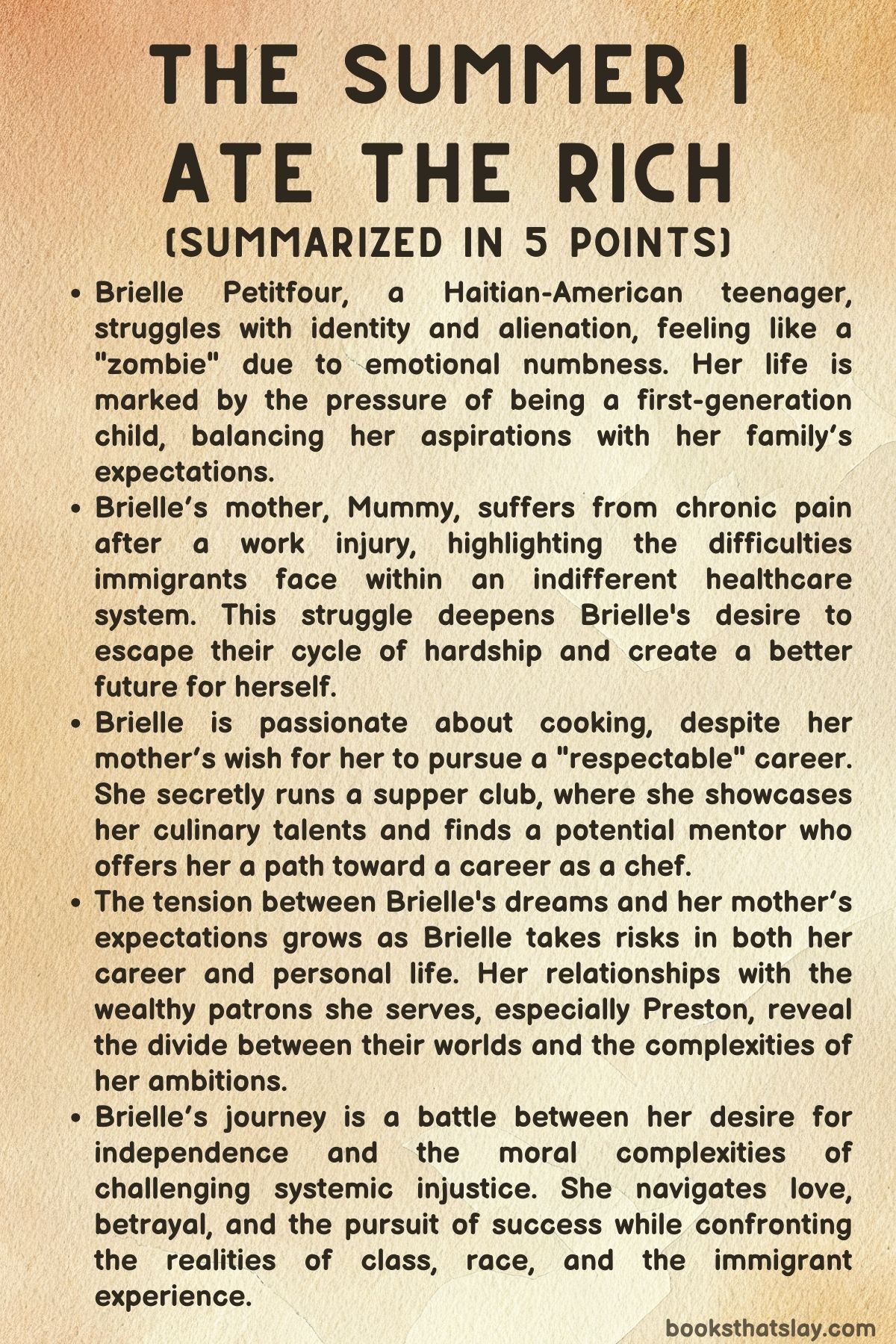The Summer I Ate the Rich Summary, Characters and Themes
The Summer I Ate the Rich by Maika Moulite and Maritza Moulite is a vivid exploration of a young Haitian-American woman’s journey through personal struggles, societal expectations, and her deep connection to food and culture. The protagonist, Brielle Petitfour, is a seventeen-year-old girl caught in the throes of her immigrant experience, grappling with the weight of her family’s expectations and her desire to pursue a career as a chef.
The narrative intricately weaves themes of family, identity, race, and ambition, showing how Brielle navigates complex relationships with her mother, her heritage, and the wealthy individuals she encounters. Through Brielle’s trials, the book explores the intersection of power, class, and personal growth, making for a compelling read that highlights the tension between staying true to one’s roots and pursuing a future defined by success.
Summary
Brielle Petitfour, a seventeen-year-old Haitian-American girl, is living in Little Haiti, Miami, where she feels isolated and emotionally detached from the world around her. Brielle refers to herself as a “zombie,” a metaphorical expression of the alienation she feels due to both her background and her unique condition.
Raised by her mother, Mummy, who is in chronic pain due to a severe back injury sustained at work, Brielle’s life is defined by hardship, sacrifice, and an unrelenting pursuit of survival. Mummy’s struggles with the healthcare system and her inability to get proper care fuel Brielle’s sense of frustration and determination to break free from the cycle of poverty and suffering.
Despite the challenges Brielle faces at home, where Mummy constantly imposes her own fears and expectations on her, Brielle has a burning passion for cooking. She dreams of becoming a chef, a career her mother disapproves of.
Mummy wants Brielle to follow a more “respectable” path, such as becoming a doctor or lawyer. However, Brielle is determined to pursue her love of food and cooking, secretly running a “supper club” where she serves breakfast-themed dishes to a small group.
During one of these events, Brielle meets Nadia, a potential mentor who offers her the chance to apprentice as a chef. This moment serves as a turning point for Brielle, as it reinforces her belief that food can be the key to her future, even if it means going against her mother’s wishes.
As Brielle’s journey progresses, the tension between her aspirations and her mother’s expectations intensifies. Mummy’s ongoing struggles with her back injury and the lack of proper medical care emphasize the systemic issues that both Brielle and her mother are facing.
Brielle sees her mother’s suffering and feels a deep sense of guilt for wanting to pursue her own path while knowing her mother depends on her. Brielle’s internal conflict escalates as she grapples with the responsibility of being the breadwinner for her family while trying to carve out a future that aligns with her own desires.
The plot unfolds as Brielle begins to work at Banks Corps, a prestigious company where she is one of the few people of color. She experiences firsthand the corporate world’s subtle racism and microaggressions, particularly from figures like Ainsley, an office superior who undermines her at every turn.
However, Brielle finds a sympathetic ally in Preston, a wealthy intern who takes an interest in her and starts offering support. Their relationship grows more complicated as Brielle’s feelings for Preston begin to evolve, and she becomes conflicted between her growing attraction to him and her desire to maintain her independence.
In addition to her work at Banks Corps, Brielle continues to pursue her passion for cooking, hosting successful supper club events where her culinary talent starts to get recognized. She begins to use these events as a platform to showcase her skills and draw attention to her ambitions.
However, the demands of her family and the harsh realities of life in Little Haiti persist. Brielle is torn between maintaining her family’s support and pursuing a future that might require her to distance herself from them.
While Brielle tries to navigate her career and personal life, the story also delves into her family’s complicated history. Brielle’s mother, Valentine, has a complex past, including a strained relationship with her husband, Franki, and an increasingly bitter relationship with the political turmoil in Haiti.
Valentine’s emotional journey takes center stage as she navigates her own struggles, seeking solace and love in an encounter with Swan Freeman Petitfour, a soldier of foreign descent. Brielle’s relationship with her mother is strained, but Brielle’s understanding of her mother’s pain deepens as she faces her own internal conflicts.
Brielle’s struggle with the wealthy elite takes a more direct turn when she becomes embroiled in an act of rebellion against the system. After inadvertently gaining access to Silas Banks, a billionaire philanthropist, Brielle decides to use his wealth for good.
She begins diverting funds to help her community, all while feeling justified in exploiting the rich for the benefit of those who have been exploited. Brielle’s actions are morally ambiguous, but they reflect her desperation to escape the economic hardships she faces.
As the narrative progresses, Brielle’s moral compass is challenged by the people she meets, the powerful corporations she works for, and her family’s struggles. She begins to realize the complex relationships between wealth, power, and social justice, all while trying to hold onto her own identity and cultural heritage.
The plot takes a darker turn as Brielle confronts the legacy of her father, who died from a drug overdose caused by a drug linked to the pharmaceutical industry. Brielle becomes determined to fight back against the corrupt systems that have contributed to her family’s suffering.
In the final chapters, Brielle’s journey comes full circle as she takes control of her destiny. She learns to embrace her roots and her passion for food while confronting the power structures that have held her back.
Brielle’s relationship with Preston continues to evolve, but she begins to understand that her true strength lies in her ability to define herself on her own terms. The story concludes with Brielle ready to face the future, armed with her culinary skills, a deeper understanding of her heritage, and a newfound sense of independence.
Brielle’s journey is one of self-discovery, resilience, and the fight for justice, making it a powerful exploration of identity, family, and the personal costs of ambition.

Characters
Brielle Petitfour
Brielle is a seventeen-year-old Haitian-American girl struggling with a complex identity and emotional numbness, which she refers to as her “zombie” state. This metaphorical condition reflects her feelings of alienation due to her immigrant background and the pain of trying to reconcile her desires with her family’s expectations.
Raised by her mother, Mummy, Brielle is caught between two worlds: one where she wants to pursue her passion for food and another where her mother wants her to take a more “respectable” career path like medicine or law. Throughout the narrative, Brielle’s passion for food becomes her form of creative expression, and she secretly hosts supper clubs to develop her culinary skills.
Her relationship with food is also tied to her emotional healing, as she learns to use it as a way to exert control over her life and to reconnect with her Haitian heritage. Brielle’s journey is filled with moments of self-discovery and empowerment, where she navigates the complexities of love, power, family, and ambition.
While Brielle strives to become a successful chef and escape the limitations imposed by her circumstances, she also grapples with the harsh realities of the world around her, including her mother’s struggles, racial discrimination, and the moral dilemmas associated with wealth and power.
Mummy (Valentine Petitfour)
Mummy, Brielle’s mother, embodies the immigrant experience and the pain of being far from home. Originally from Haiti, Mummy’s life in America has been filled with hardship, particularly after a severe back injury that leaves her in chronic pain.
Her struggles with the healthcare system, which is both indifferent and exploitative, only deepen her sense of frustration and alienation. Mummy’s relationship with Brielle is central to the story, as she simultaneously represents an anchor of comfort and a constraint that holds Brielle back from pursuing her own dreams.
She wants Brielle to succeed in a traditional, respectable career, a common desire for immigrant parents who hope to ensure their children avoid the hardships they’ve faced. However, Mummy’s own emotional numbness and inability to express love in a traditional sense reflect the generational and cultural rift between her and Brielle.
Despite this, she remains a source of support and love, even though her inability to understand Brielle’s aspirations creates tension. Mummy’s narrative is also shaped by her difficult memories of Haiti, which add layers of bitterness and frustration toward the political and economic forces that have shaped her life.
Preston
Preston, a wealthy and seemingly friendly intern at Banks Corps, plays a significant role in Brielle’s emotional and professional journey. Initially, he seems like a simple ally, offering support when Brielle faces the microaggressions and isolation of being one of the few people of color at the company.
As their relationship develops, Preston becomes more than just a source of comfort; he represents a world that is vastly different from Brielle’s own. Coming from immense privilege, Preston’s presence in Brielle’s life complicates her sense of identity and belonging.
While Brielle uses her relationship with Preston to gain access to powerful circles, she also finds herself conflicted by her growing feelings for him. Their contrasting backgrounds – Brielle’s working-class immigrant experience and Preston’s elite status – serve as a backdrop for a nuanced exploration of love, privilege, and power.
Preston is both a romantic interest and a symbol of Brielle’s internal struggle, as she balances her personal aspirations with the ethical dilemmas posed by the inequality she witnesses around her.
Silas Banks
Silas Banks, Preston’s father and a key figure at Banks Corps, represents the epitome of capitalist greed and exploitation. His ruthless business practices and focus on profit at the expense of human lives are a source of deep resentment for Brielle, particularly because of the role his company played in her father’s death due to a drug overdose.
Silas serves as a direct antagonist to Brielle’s aspirations and moral compass. His lack of regard for the social consequences of his actions fuels Brielle’s desire for revenge, motivating her to challenge the corporate practices that have harmed her family and many others.
Through Silas, the novel critiques the broader economic and power systems that perpetuate inequality and exploitation. His character is emblematic of the corrupt elite who view people as disposable, and his cold, calculating nature offers a stark contrast to Brielle’s more human, empathetic worldview.
Swan Freeman Petitfour
Swan Freeman Petitfour, a soldier of foreign descent, briefly crosses paths with Valentine during a moment of emotional vulnerability. This encounter becomes a significant moment in Valentine’s life, offering her a glimpse of a romantic connection after years of emotional neglect and hardship.
Swan’s attraction to Valentine and the brief but intense interaction between them symbolize a potential escape from the struggles she has faced with her husband, Franki. The relationship between Swan and Valentine, though short-lived, underscores the themes of love and connection in a life marked by political and personal instability.
Swan represents the possibility of new beginnings for Valentine, even as she remains tethered to the painful realities of her life in Haiti and her complicated relationship with her husband.
Ainsley
Ainsley is an office superior at Banks Corps who embodies the subtle racial biases and microaggressions that Brielle faces in the corporate world. As one of the few people of color in the company, Brielle often feels isolated and scrutinized, and Ainsley’s behavior only amplifies these feelings.
Ainsley’s undermining of Brielle creates a sense of tension and alienation, highlighting the everyday racial discrimination that Brielle must navigate as she tries to carve out a career in a space that is predominantly white and elitist. Ainsley’s character serves as a reminder of the subtle yet pervasive nature of systemic racism and the challenges Brielle faces in trying to succeed in such an environment.
Franki
Franki, Brielle’s estranged father, is a tragic figure in the narrative. His relationship with Valentine is marked by emotional neglect and a descent into greed.
His ambition and desire for material success have transformed him into a figure of disappointment and bitterness in his family’s eyes. Franki’s struggles are amplified by the political instability in Haiti, but his personal failings—especially his inability to support his family emotionally—are central to the pain Brielle and her mother experience.
His death from a drug overdose, linked to the drug oxymorphenol produced by Banks Corps, becomes a catalyst for Brielle’s desire for justice and revenge. Through Franki, the narrative explores themes of family, failure, and the impact of systemic exploitation on individuals.
Nadia
Nadia is a key mentor figure for Brielle, offering her the opportunity to apprentice under her as a chef. Nadia’s mentorship becomes a pivotal turning point in Brielle’s journey, as it provides her with a chance to pursue her passion for cooking despite the obstacles she faces.
Nadia’s character represents the possibility of success and growth outside the constraints of Brielle’s family’s expectations. Her influence on Brielle helps shape Brielle’s understanding of her potential and the possibilities for her future in the culinary world, serving as a guiding force in Brielle’s quest for independence and fulfillment.
Thalia, Melpo, Clionie, and Callisse
These characters provide additional layers of emotional and cultural context to the story, each contributing a different perspective on the struggles faced by Brielle and her family. Thalia’s pragmatic view of Valentine’s emotional journey reflects the disillusionment many face when witnessing the decay of their family unit.
Melpo’s tragic outlook on Valentine’s situation underscores the emotional weight of living in a strained relationship, while Clionie contextualizes their struggles within the broader political and historical context of Haiti. Callisse’s poem, skeptical of love’s longevity, highlights the transience of emotions in the face of adversity.
Together, these characters add depth to the emotional landscape of Brielle’s world, offering different ways of understanding the tensions within her family and community.
Themes
Identity and Self-Discovery
The theme of identity is central to The Summer I Ate the Rich, with Brielle’s journey marked by her struggle to understand and embrace who she is within a complex web of cultural, familial, and societal expectations. As a Haitian-American, Brielle is torn between two worlds—her heritage and the pressures of fitting into mainstream American society.
This tension is exacerbated by her metaphorical condition as a “zombie,” reflecting her sense of emotional detachment and alienation. Brielle’s identity is not simply defined by her ethnicity but also by her experiences growing up as a first-generation child in a family that holds onto its Haitian roots while attempting to adapt to the American way of life.
Throughout the narrative, Brielle’s internal conflict regarding her place in the world drives much of her character development. Her exploration of food, especially her fascination with the texture of beef brain, symbolizes her broader struggle with societal divisions and expectations.
As Brielle attempts to carve out her future, her emotional numbness slowly starts to give way to a more defined sense of self, albeit one that is fraught with the challenges of balancing ambition, family loyalty, and personal desires. Her culinary passion becomes a form of self-expression, offering a tangible way to assert her identity amidst a world that often devalues her.
Family Loyalty and Tension
Family dynamics are another significant theme explored in the novel, particularly the tension between Brielle and her mother, Mummy. The struggles of immigrant families often involve navigating the space between generational expectations and the desires of the younger generation, and this is especially poignant for Brielle.
Mummy’s hopes for Brielle to follow a “respectable” career path—such as becoming a doctor or lawyer—clashes with Brielle’s passion for cooking. The weight of these differing aspirations places immense pressure on Brielle, especially as she grapples with the responsibility of potentially being the primary provider for the family due to her mother’s debilitating injury and the financial hardships they face.
Mummy’s own struggles with pain, healthcare, and the systemic inequalities she faces as an immigrant create a backdrop of constant tension, where Brielle feels both deeply connected to her mother’s suffering and simultaneously constrained by the expectations placed on her. The familial love is evident, yet it is tainted by a sense of duty and sacrifice that feels both suffocating and motivating for Brielle.
Her journey is about reconciling her love for her family with her need to assert her independence and pursue her dreams. This emotional struggle forms the backbone of Brielle’s narrative, highlighting the challenges of breaking away from familial expectations without abandoning the people who have shaped her.
Social Inequality and Power
The exploration of social inequality and power dynamics runs through much of The Summer I Ate the Rich, with Brielle caught in the stark contrasts between her working-class background and the wealth and privilege of the upper class. Brielle’s internship at Banks Corps, a prestigious company that represents the epitome of corporate America, exposes her to the deep inequalities embedded within the social structure.
The microaggressions and overt racial biases she encounters at work are constant reminders of the systemic obstacles she faces as a person of color in a predominantly white, elite environment. These social dynamics are mirrored in Brielle’s evolving relationship with Preston, a wealthy intern whose life of privilege contrasts sharply with Brielle’s.
Despite their differences, Brielle uses her connection with Preston strategically, leveraging her position to navigate powerful circles while also dealing with the ethical dilemmas surrounding wealth and power. This tension is heightened by Brielle’s moral conflict, as she becomes involved in “Robin Hood” like activities, redirecting money from the wealthy to benefit her community.
The narrative critiques the corrupt and exploitative systems that perpetuate wealth inequality, particularly through figures like Silas Banks, whose corporate practices have directly harmed Brielle’s family. Brielle’s realization of the power structures at play leads to her resolve to challenge and expose the systems that perpetuate these inequalities, ultimately making her journey one of resistance and empowerment.
The Immigrant Experience and Displacement
The immigrant experience is a theme that resonates throughout the novel, particularly in the experiences of Brielle and her family. The narrative portrays the emotional and physical toll of migration, as well as the challenges of adjusting to life in a new country while maintaining ties to one’s cultural heritage.
Mummy’s sense of displacement is palpable; she longs for Haiti and feels the loss of connection to her homeland, particularly as she faces the harsh realities of life in America. The emotional and physical toll of being an immigrant is further compounded by systemic issues like inadequate healthcare and exploitation in the workplace.
For Brielle, the immigrant experience is layered with a sense of responsibility—not just to her mother, but to her community, which is often marginalized. The tensions between assimilation and the preservation of cultural identity form a significant part of Brielle’s internal conflict.
While her mother’s generation strives to hold on to their Haitian roots, Brielle’s generation is caught in the middle, trying to find a place in a society that demands assimilation while still holding onto the values of their heritage. Brielle’s journey reflects the complexities of navigating this duality, as she strives to reconcile her Haitian-American identity with her ambitions and desires.
Revenge and Empowerment
Revenge is a significant motivator in Brielle’s journey, serving as both a tool of empowerment and a reflection of her emotional turmoil. As Brielle deals with the aftermath of her father’s death—caused by a drug distributed by Banks Corps—she channels her anger and grief into a desire for retribution against those responsible.
This pursuit of revenge is tied to her growing realization of her own power and agency, as she uses her culinary skills as a means of exerting control over her world. Her supper club, initially a way to express herself creatively, becomes a platform for her to gain recognition and leverage her position within the elite social circles she has infiltrated.
Brielle’s ability to use food as a weapon, to manipulate and influence the people around her, symbolizes her increasing mastery over her fate. However, as her relationship with Preston deepens, Brielle begins to wrestle with the consequences of her actions and the ethical cost of her pursuit of revenge.
The theme of empowerment is complex; it is not just about taking control of her life but also understanding the personal cost of such power. Brielle’s path is one of self-discovery, where she learns that true empowerment lies not just in achieving her goals but in making peace with her own choices and the people she impacts along the way.


